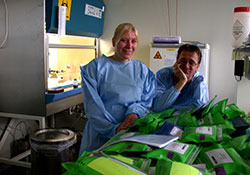What is your daily work now?

Rob van Binnendijk
Testing up to 80 samples a day: Dr Meijer
At this time of year we would normally be analysing virus strains from the previous season and updating the seasonal influenza test kits for the coming season. We usually receive between 40 and 50 specimens a week in the summer months before surveillance of seasonal influenza begins. Now, however, we are getting between 30 and 80 samples to test every day. Once we have the test results, we then report our findings to national authorities, the European Centre for Disease Prevention and Control and WHO, as well as ensuring the patients receive the results. In the past few weeks we have also developed our own test for pandemic (H1N1) 2009, and have been working together with our partner at the national influenza centre on preparing a network of outbreak assistance laboratories in the Netherlands to detect the new virus with validated tests.
Not a routine life – working until 3 a.m.: Dr Ciblak
We are a university laboratory consisting of a professor and two assistants. Work testing samples has come in addition to our regular surveillance work; we are now on two shifts a day, and the pressure is on to send results to the Ministry of Health. Our surveillance work is for 14 provinces, and now we have to cover 81 cities. So far we have tested hundreds of samples. But there is good collaboration, particularly with our sister national influenza reference laboratory in Ankara, and in communicating with the Ministry about resources and equipment.
More paperwork and meetings: Dr Mironenko
We work 10 or 11 hours every day and still do not manage to do everything that is requested. Every day is different. In addition to more paperwork and reporting to the Ministry of Health, I have given television, radio and newspaper interviews, and regularly speak to journalists, as well as dealing with extra laboratory work. Further, we must advise and consult with virologists throughout the country, and with medical workers, Ministry authorities, and even the public.
Daily requests from other laboratories: Dr Ellis
In the early stages of the pandemic, we did all the testing for the pandemic (H1N1) 2009 virus. Now the tests that we developed at the beginning of the pandemic have been rolled out to regional and other hospital laboratories in England and Northern Ireland, and reference laboratories in Scotland, Wales and Northern Ireland, so they now provide front-line testing on samples that they receive. We have regular teleconferences with the regional labs in the United Kingdom to exchange information, and discuss logistical issues such as specimen transport or changes to testing methods. We also receive daily requests from laboratories both in the United Kingdom and abroad, for methods or advice on testing. I meet with staff undertaking developmental work on improving tests or developing new tests to detect the virus, and discuss the results and plan experiments.



